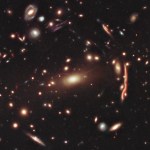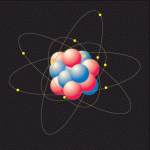Paradox
The new film Arrival, based on a story by Ted Chiang, is unlike most any science fiction blockbuster at the box office these days. It's a tense, thoughtful, somber meditation on the human condition and the nature of a higher reality. In many ways, it is a religious film that deals with eschatology (the end times or judgment day).
Unlike Chad Orzel, I haven't read the source material, so I experienced the film with fresh eyes. I was immediately reminded of Philip K. Dick and his real-life experience of being 'touched by an angel.' Dick, both a life-long Christian and prolific author of…
“You wait for a gem in an endless sea of blah.” -Lawrence Grossman
On the one hand, we have General Relativity, our theory of space, time, and gravity.
Image credit: Wikimedia commons user Johnstone; Earth from NASA's Galileo mission.
It describes the Universe on both large and small scales perfectly, from the hot Big Bang to our cold accelerating expansion, from vast superclusters of galaxies down to the interiors of black holes.
Image credit: NASA, ESA, M. Postman (STScI), and the CLASH Team.
But General Relativity doesn't tell us everything. It doesn't tell us, for example,…
Yesterday's post on a variation of the "Twin Paradox" with both twins accelerating was very successful-- 337 people voted in the first poll question, as of a little before 9am, and the comments to the original post are full of lively discussion. That's awesome.
I wish I could take credit for it, but the problem posed is not original to me. It comes from a 1989 paper in the American Journal of Physics, which also includes the following illustration setting up the situation:
The article contains a full explanation, and also the following figure illustrating the result:
The correct answer is…
Just about everybody has heard of the Twin Paradox in relativity: one twin becomes as astronaut and sets off for Alpha Centauri, the other remains on Earth at mission control. Thanks to time dilation, the two age at different rates, and the one who made the trip out and back ends up younger than the one who stayed behind.
Of course, the paradox is not that the two twins have different ages-- rather, it's that from a simple approach to special relativity, you would think that each twin should see the other's clock running slow, since it seems like getting into a rocket and flying off into…
This has been all over my inbox since the press release came out yesterday; it's been on slashdot (thanks Brian), it's been at space.com, and there's a mediocre writeup on Universe Today. What's the big news? Black Holes don't destroy information after all!
What is this whole information thing, anyway? Take a look at all the normal stuff in the Universe: photons, protons, neutrons, and electrons, for example. They have lots of different properties each. They move around one another, they get bound and unbound from one another, they exert forces on one another, etc. They're aware of one…


